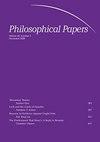认知的禁锢、具体意义的创造与知识的(去)殖民
IF 1.3
3区 哲学
0 PHILOSOPHY
引用次数: 2
摘要
摘要本文认为认知限制的概念是理解知识非殖民化思想和相反的认知殖民化概念的有用工具。为了实现上述目标,本文将关于认知(去)殖民化的论述置于认知科学中出现的一种范式的背景下,即具体认知。认知限制在这里被理解为一种病态的情况,在这种情况下,一个人的认知追求所处的环境逐渐发生变化,阻碍了这些追求,并降低了一个人解决真实问题,特别是局部问题的能力。本文还提出了一个案例研究。也就是说,它追随了那些思想家,最著名的是Naomi Klein,他们认为中欧和东欧国家从苏联支持的共产主义到自由市场资本主义的“休克疗法”转变是一种新的、独特的殖民化浪潮。本文简要讨论了这一过程的认识或认知方面。本文章由计算机程序翻译,如有差异,请以英文原文为准。
Cognitive Confinement, Embodied Sense-Making, and the (De)Colonization of Knowledge
Abstract This paper posits the concept of cognitive confinement as a useful tool for understanding the idea of decolonization of knowledge and the opposite notion of epistemic colonization. For the sake of the mentioned goal, the paper places the discourse on epistemic (de)colonization within the context of a paradigm emerging in the cognitive sciences, referred to as embodied cognition. Cognitive confinement is understood here as a pathological situation in which the environment in which one’s epistemic pursuits are embedded gradually transforms in such a way as to impede these pursuits and downgrade one’s capacity to address real, especially local, problems. The paper also brings up a case study. Namely, it follows those thinkers, most famously Naomi Klein, who regard the ‘shock-therapeutic’ transition from Soviet-backed communism to free market capitalism undergone by the countries of Central and Eastern Europe as a new and peculiar wave of colonization. The paper briefly discusses the epistemic or cognitive, broadly construed, aspect of this process.
求助全文
通过发布文献求助,成功后即可免费获取论文全文。
去求助
来源期刊

Philosophical Papers
PHILOSOPHY-
CiteScore
2.10
自引率
0.00%
发文量
18
期刊介绍:
Philosophical Papers is an international, generalist journal of philosophy edited in South Africa Original Articles: Articles appearing in regular issues are original, high-quality, and stand-alone, and are written for the general professional philosopher. Submissions are welcome in any area of philosophy and undergo a process of peer review based on initial editor screening and refereeing by (usually) two referees. Special Issues: Topic-based special issues are comprised of both invited and submitted papers selected by guest editors. Recent special issues have included ''Philosophy''s Therapeutic Potential'' (2014, editor Dylan Futter); ''Aging and the Elderly'' (2012, editors Tom Martin and Samantha Vice); ''The Problem of the Criterion'' (2011, editor Mark Nelson); ''Retributive Emotions'' (2010, editor Lucy Allais); ‘Rape and its Meaning/s’ (2009, editor Louise du Toit). Calls for papers for upcoming special issues can be found here. Ideas for future special issues are welcome.
 求助内容:
求助内容: 应助结果提醒方式:
应助结果提醒方式:


